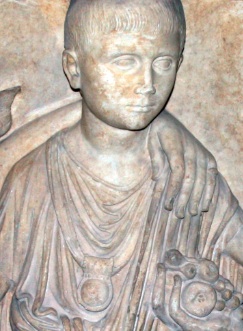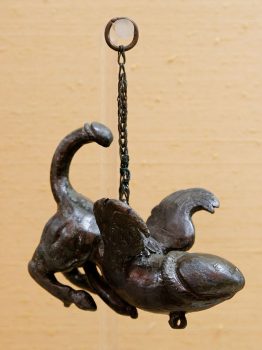Roman Superstitions Posted by Brittany Britanniae on Oct 15, 2019 in Latin Language, Roman culture
Salvete Omnes, This week I would like you to think about your superstitions while we visit ancient ones…Superstitions were an important staple in many ancient cultures, and the Romans were no exception. In the religions of ancient Rome, an omen, plural omina, was a sign intimating the future, considered less important to the community than a prodigium but of great importance to the person who heard or saw it. Omina could be good or bad.
Common Superstitious Activities and Accounts:
- A Bulla, an amulet worn like a locket,
 were enigmatic objects of lead, sometimes covered in gold foil, if the family could afford it. A bulla was worn around the neck as a locket to protect against evil spirits and forces. Bullae (plural) were made of differing substances depending upon the wealth of the family.
were enigmatic objects of lead, sometimes covered in gold foil, if the family could afford it. A bulla was worn around the neck as a locket to protect against evil spirits and forces. Bullae (plural) were made of differing substances depending upon the wealth of the family. - A haruspex (plural haruspices) was a person trained to practice a form of divination called haruspicy (haruspicina), the inspection of the entrails (exta—hence also extispicy (extispicium)) of sacrificed animals, especially the livers of sacrificed sheep and poultry. In Italy, divination was practiced by the Etruscans, the Romans and the Umbrians. The Etruscans were well known for the practice of divining by the entrails of sheep. The continuity of the Etruscan tradition among the Romans is indicated by several ancient literary sources, perhaps most famously in the incident related by Suetonius in which a haruspex named Spurinna warned Julius Caesar to beware the Ides of March.
Et immolantem haruspex Spurinna monuit, caveret periculum, quod non ultra Martias Idus proferretur.
Again, when he was offering sacrifice, the soothsayer Spurinna warned him to beware of danger, which would come not later than the Ides of March.
- A fascinus or fascinum was the embodiment of the divine phallus. The word can refer to the deity himself (Fascinus), to phallus effigies and amulets, and to the spells used to invoke his divine protection. Pliny calls it a medicus invidiae, a “doctor” or remedy for envy (invidia, a “looking upon”) or the evil eye.
- Headaches they believed could be cured by taking an herb found growing near the heads of statues and wrapping them around one’s neck.
By pouring vinegar upon the hinges of a door, a thick liniment is formed, which, applied to the forehead, will alleviate headache
cardinibus ostiorum aceto adfusis lutum fronti inlitum capitis dolorem sedare (Pliny’s Natural History Book XXVIII Chapter XII)
- “Left side” or ” Left handedness” In early Roman times, the left side retained a positive connotation, as the Augures proceeded from the eastern side.The negative meaning was subsequently borrowed into Latin from Greek, and ever since in all Roman languages. The expression “getting up on the wrong side of the bed” supposedly evolved from getting up on the “right side”, which in turn grew out the Roman belief that the left side was evil. The the Latin word for “left” is “sinister” and first “footmen” were hired by Roman nobles to makes sure guests entered their houses right foot first.
- Bees were an omen; godly messengers. However, it depended on their presence and numbers for their meaning. The Roman historian, Appian, explains how a swarm of bees was an evil portent of a battle’s demise.

- Lightning, due to its association with a Jupiter, could have a variety of meanings from bad to good depending on the interpretation. The association of lightning with a godly message is seen across many civilizations and even today. Lightning and thunder were important because the Romans feared these omens as seen in Livy’s account of an election:
Whilst he was assuming the duties of the consulship thunder was heard; the augurs were summoned and gave it as their opinion that there was some informality in his election. The patricians spread a report that as that was the first time that two plebeian consuls were elected together, the gods were showing their displeasure. Marcellus resigned his office and Q. Fabius Maximus was appointed in his place; this was his third consulship. This year the sea appeared to be on fire; at Sinuessa a cow brought forth a colt; the statues in the temple of Juno Sospita at Lanuvium sweated blood and a shower of stones fell round the temple. (The History of Rome, 23.31)
cui ineunti consulatum cum tonuisset, uocati augures uitio creatum uideri pronuntiauerunt;
uolgoque patres ita fama ferebant, quod tum primum duo plebeii consules facti essent,
id deis cordi non esse.in locum Marcelli, ubi is se magistratu abdicauit, suffectus Q. Fabius Maximus tertium. mare arsit eo anno;
ad Sinuessam bos eculeum peperit; signa Lanuui ad Iunonis Sospitae cruore manauere lapidibusque circa id templum pluit,
ob quem imbrem nouendiale, ut adsolet, sacrum fuit; ceteraque prodigia cum cura expiata.
(Ab urbe condita 23.31)
- Often, sacred chickens were taken to battles on land or sea. If they refused to eat or even flew away was considered a bad omen. At both the battle against the Samnites (293 bc) and the battle of Drepanum the chickens refused to eat. Both consuls attacked anyway. The outcome of both battles was very different (one won the battle; the other lost the battle)
Conclusion
I would love to hear your thoughts or of other superstitions from Rome you have heard of! Thanks for reading!

Build vocabulary, practice pronunciation, and more with Transparent Language Online. Available anytime, anywhere, on any device.




